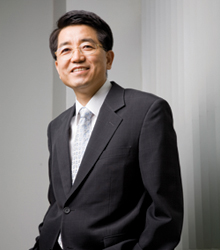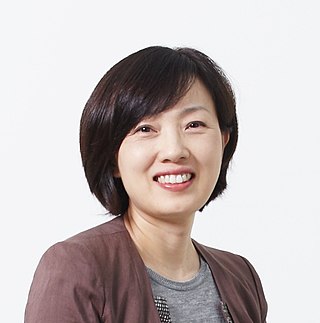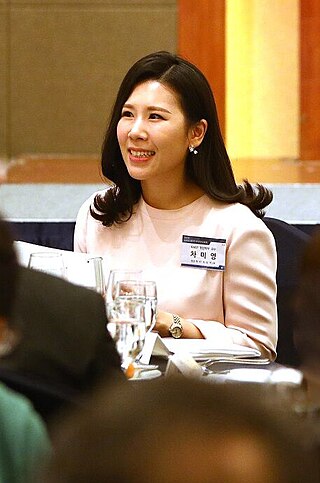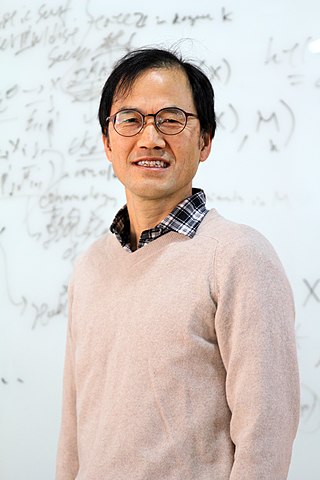
Young-Tae Chang is a South Korean chemist. He is a professor of chemistry at Pohang University of Science and Technology (POSTECH) and Associate Director under Kim Kimoon at the Center for Self-assembly and Complexity at the Institute for Basic Science located on the POSTECH campus.

Taeghwan Hyeon is a South Korean chemist. He is SNU distinguished professor in the School of Chemical and Biological Engineering at Seoul National University, director of Center for Nanoparticle Research of Institute for Basic Science (IBS), and an associate editor of the Journal of the American Chemical Society.

V. Narry Kim is a South Korean biochemist and microbiologist, best known for her work on microRNA biogenesis. Her pioneering studies have laid the groundwork for the biology of microRNA and contributed to the improvement of RNA interference technologies.

Kim Kimoon is a South Korean chemist and professor in the Department of Chemistry at Pohang University of Science and Technology (POSTECH). He is the first and current director of the Center for Self-assembly and Complexity at the Institute for Basic Science. Kim has authored or coauthored 300 papers which have been cited more than 30,000 times and he holds a number of patents. His work has been published in Nature, Nature Chemistry, Angewandte Chemie, and JACS, among others. He has been a Clarivate Analytics Highly Cited Researcher in the field of chemistry in 2014, 2015, 2016.

Noh Tae-won is a South Korean physicist and director of the Center for Correlated Electron Systems (CCES) in the Institute for Basic Science (IBS) at Seoul National University (SNU). He has published more 400 papers and been cited 15,000 times. He is a member of the Materials Research Society, Korean Optical Society, Korean Crystallographic Society, and Association of Asia Pacific Physical Societies and been on several editorial boards for journals. In 2017, he became president of the Korean Dielectrics Society.

Yeom Han-woong is a South Korean physicist. A tenured professor at POSTECH, he has led several research centers for the university and from 2013 in collaboration with the Institute for Basic Science. He is a Fellow of the American Physical Society and has served as vice chairman of the Korean government's first science and technology advisory group for three consecutive terms. With more than 300 publications to his name, his research has been cited over 5,000 times giving him an h-index of 40 and i10-index of 125.

Cheon Jinwoo is the H.G. Underwood Professor at Yonsei University and the Director of the Center for Nanomedicine, Institute for Basic Science (IBS). As a leading chemist in inorganic materials chemistry and nanomedicine Cheon and his group research chemical principles for the preparation of complex inorganic materials. He has been a Clarivate Analytics Highly Cited Researcher both in the field of chemistry in 2014, 2015, 2016 and cross-field in 2018. He is a fellow of the American Chemical Society, Royal Society of Chemistry, and Korean Academy of Science and Technology, a senior editor of Accounts of Chemical Research and an editorial advisory board member of Journal of Materials Chemistry, Nano Letters and Materials Horizons.

Eunjoon Kim is a professor of KAIST and director of Center for Synaptic Brain Dysfunctions within the Institute for Basic Science (IBS). His current research focuses on molecular mechanisms underlying autism spectrum disorders and synaptic brain dysfunctions. With over 200 publications to his name, his research has been cited over 27,000 times giving him an h-index of 81. He graduated from Busan National University in 1986, received master's degree at KAIST in 1988, received PhD degree at Michigan State University in 1994, and worked at Harvard Medical School as a postdoctoral fellow during 1995-1996. His current research focuses on molecular organization of neuronal synapses and synapse dysfunction-related psychiatric disorders.
Cheon, Jung Hee is a South Korean cryptographer and mathematician whose research interest includes computational number theory, cryptography, and information security. He is one of the inventors of braid cryptography, one of group-based cryptography, and approximate homomorphic encryption HEAAN. As one of co-inventors of approximate homomorphic encryption HEaaN, he is actively working on homomorphic encryptions and their applications including machine learning, homomorphic control systems, and DNA computation on encrypted data. He is particularly known for his work on an efficient algorithm on strong DH problem. He received the best paper award in Asiacrypt 2008 for improving Pollard rho algorithm, and the best paper award in Eurocrypt 2015 for attacking Multilinear Maps. He was also selected as Scientist of the month by Korean government in 2018 and won the POSCO TJ Park Prize in 2019.

Koh Gou Young is a researcher from South Korea studying organ vasculature and lymphatic vessels with an interest in angiogenesis, lymphangiogenesis, adipogenesis, and cardiogenesis. His research has contributed to the publication of more than 200 journal articles, including multiple publications on how Tie2 deficits are related to sepsis, blood-retinal barrier damage, and an imbalance of intraocular pressure in Schlemm's canal which induces glaucoma.
The Korea Science Award is an award presented to South Koreans and Korean scientists working in domestic universities or research positions. It is currently jointly presented by the Ministry of Science and ICT and the National Research Foundation of Korea. Research achievements are limited to that of a single project conducted in Korea. Potential recipients go through a several stage review which includes consolation with foreign scholars.

Cha Meeyoung, sometimes known as Mia, is an associate professor at KAIST in the School of Computing and a chief investigator in the Pioneer Research Center for Mathematical and Computational Sciences at the Institute for Basic Science. Her research focuses on network and data science with an emphasis on modeling, analyzing complex information propagation processes, machine learning-based computational social science, and deep learning. In June 2024, she will become the scientific director of the Max Planck Institute for Security and Privacy. She has served on the editorial boards of the journals PeerJ and ACM Transactions on Social Computing.
Kuk Young is a South Korean physicist, former physics professor and vice-provost of research of Seoul National University, distinguished professor of Ewha Womans University, and chairman of the Samsung Science and Technology Foundation. He is a fellow of the American Physical Society, Korean Academy of Science and Technology, Institute of Physics, Korean Physical Society, and Korean Vacuum Society. He has performed editor roles for the journals Nanotechnology, ACS Nano, and Solid State Electronics and is the fourth president of Daegu Gyeongbuk Institute of Science and Technology (DGIST).

Choi Kiwoon is a theoretical particle physicist researching focusing on particle theory and cosmology. He was a research professor at Chonbuk National University and a full professor at KAIST. He is the founding director of the Institute for Basic Science Center for Theoretical Physics of the Universe. He is a member of the Korean Academy of Science and Technology.

Changjoon Justin Lee is an American neuroscientist specializing in the field of glioscience. He served as the Director of Center for Neuroscience at the Korea Institute of Science and Technology and later founded the WCI Center for Functional Connectomics as part of the World Class Institute Program. In 2015, he established the Center for Glia-Neuron Interaction before becoming co-director of the IBS Center for Cognition and Sociality and head of the Cognitive Glioscience Group in 2018. He has been on the editorial boards of the journals Molecular Brain and Molecular Pain and is a chief editor of Experimental Neurobiology.

Oum Sang-il is a Korean mathematician working in graph theory and discrete mathematics. He is a tenured professor in the Department of Mathematical Sciences at KAIST and the chief investigator of the Discrete Mathematics Group in the Pioneer Research Center for Mathematical and Computational Sciences at the Institute for Basic Science. He is known for his work on structural graph theory and in particular for structures and algorithms relating to rank-width, clique-width, and branch-width. He published more than 45 journal papers.

Roe Jung-hye is a South Korean professor of Molecular biology at Seoul National University served as the 6th President of National Research Foundation of Korea - the first woman to lead the Foundation or its preceding foundations from 2018 to 2021.

Oh Yong-Geun is a mathematician and distinguished professor at the Pohang University of Science and Technology and founding director of the IBS Center for Geometry and Physics located on that campus. His fields of study have been on symplectic topology, Floer homology, Hamiltonian mechanics, and mirror symmetry He was in the inaugural class of fellows of the American Mathematical Society and has been a member of Institute for Advanced Study, Korean Mathematical Society, and National Academy of Sciences of the Republic of Korea and is on the editorial boards of Journal of Gokova Geometry and Topology and Journal of Mathematics of Kyoto University.
National Scientist of the Republic of Korea was an award bestowed between 2005 and 2012. The prize was established by the Ministry of Education, Science and Technology to achieve the world's best research results by providing research funds of 1.5 billion KRW per year to a total of 10 scientists. Research prize funding ended when their affiliation changed. Envisioned as the highest scientific award of the nation, it was initially presented to Hwang Woo-suk in 2005 under the name Top Scientist (최고과학자) with an annual funding prize of 3 billion KRW given over three years. Due to his scandal, the award was withdrawn from Hwang, the name of the prize was changed and the research funding was reduced. The reformed award was given in 2006, 2007, 2010 and last bestowed in 2012. The end of the award coincided with the founding of the Institute for Basic Science with five laureates changing their affiliation to the new institute.
POSCO TJ Park Prize is an annual award presented by the POSCO TJ Park Foundation in four categories; science, education, community development and philanthropy, and technology. The science prize is given to Korean scientists in natural science or engineering. The education prize, community development and philanthropy prize, and technology prize are given to an individual and/or an organization. Only the community development and philanthropy prize is not retricted by nationality. Recommendations are received from June to September, cadidates are screened from October to December, the winners are announced in January and the prize presentation ceremony happens in April.















